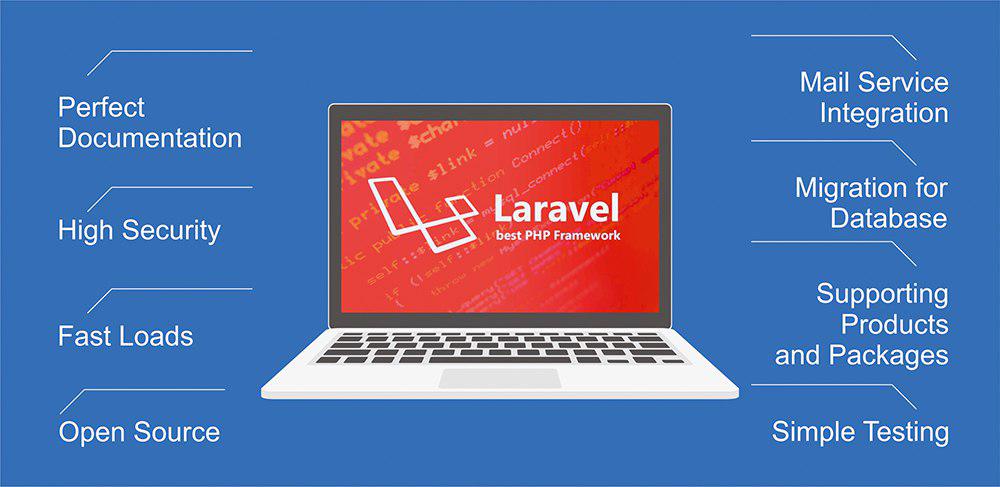Laravel Web Development
In the ever-evolving landscape of web development, Laravel has emerged as one of the most popular PHP frameworks, known for its elegance, flexibility, and developer-friendly features. Laravel facilitates the process of building web applications by providing a structured and intuitive foundation. In this article, we will explore the key aspects of Laravel web development and understand why it has gained widespread acclaim in the development community.
 Why Choose Laravel for Web Development
Why Choose Laravel for Web Development
Before delving into the technical aspects, let’s explore the reasons why Laravel is an excellent choice for web development. Laravel’s expressive syntax, modular design, and rich feature set contribute to its widespread adoption among developers. Furthermore, the active community and extensive documentation make it easier for developers to learn and implement Laravel effectively.
Setting Up Laravel Environment
To begin with Laravel development, you need to set up the development environment. Installing Laravel is a straightforward process, thanks to Composer, a PHP package manager. We will also explore the Laravel directory structure to understand the organization of files and folders in a Laravel project.
Laravel Basics
With the environment set up, we can now dive into Laravel basics. We will learn how to create routes to handle incoming requests and associate them with corresponding controllers. Additionally, we will explore the role of models in managing data and how to use the powerful Blade templating engine to design the user interface.
Working with Databases in Laravel
A fundamental aspect of web development is interacting with databases. Laravel offers a convenient way to manage database migrations and seeders, enabling smooth database setup and data seeding. We will also explore the query builder and Eloquent ORM, which simplify database operations in Laravel.
Authentication and Authorization
Securing web applications is crucial, and Laravel provides robust solutions for user authentication and role-based authorization. We will cover how to implement user authentication and restrict access to certain parts of the application based on user roles.
Laravel Packages and Extensions
Laravel’s package manager, Composer, opens doors to a vast ecosystem of third-party packages and extensions. We will explore how to leverage Composer and introduce some popular Laravel packages that can significantly enhance the functionality of your web applications.
Handling Forms and Validation
Web forms are ubiquitous in web applications, and Laravel offers elegant ways to handle form creation and validation. We will demonstrate how to create forms and validate user input effectively to maintain data integrity.
Uploading Files in Laravel
Dealing with file uploads is a common task in web development. Laravel provides straightforward methods for handling file uploads and storing them securely. We will also explore the concept of filesystems in Laravel for efficient file management.
RESTful API Development with Laravel
Laravel excels not only in building web applications but also in creating APIs. We will dive into the world of RESTful API development using Laravel, covering API routes, controllers, and authentication mechanisms.
Caching and Performance Optimization
Performance is a critical aspect of web applications. Laravel offers various caching mechanisms to boost application speed. We will discuss caching techniques and explore performance optimization tips and tricks.
Security Best Practices in Laravel
Security is of paramount importance in any web application. Laravel comes with built-in security features to protect against common vulnerabilities. We will cover best practices to safeguard your Laravel applications from potential threats like Cross-Site Scripting (XSS) and SQL injection.
Error Handling and Logging
Error handling is essential for providing a seamless user experience. Laravel allows developers to create custom error pages and log errors for debugging and troubleshooting purposes.
Testing in Laravel
Testing is an integral part of the development process. Laravel offers a robust testing suite using PHPUnit. We will explore feature and unit testing to ensure the reliability and stability of your applications.
Conclusion
Laravel has undoubtedly transformed the landscape of web development with its elegant syntax, extensive features, and active community support. By choosing Laravel for your web development projects, you ensure a streamlined and enjoyable development experience. Embrace the power of Laravel and unlock endless possibilities for building modern, robust, and scalable web applications.
FAQs
- Is Laravel suitable for beginners?
- Yes, Laravel’s expressive syntax and comprehensive documentation make it beginner-friendly, allowing newcomers to get started quickly.
- Can I integrate other PHP libraries with Laravel?
- Absolutely! Laravel’s Composer integration enables seamless integration with various PHP libraries and packages.
- Is Laravel suitable for large-scale applications?
- Yes, Laravel’s modular and scalable architecture makes it well-suited for building large and complex web applications.
- How often does Laravel receive updates?
- Laravel follows a frequent release schedule, providing regular updates and improvements to the framework.
- Does Laravel support database migrations for different database systems?
- Yes, Laravel’s database migration system supports various database systems, including MySQL, PostgreSQL, SQLite, and more.

